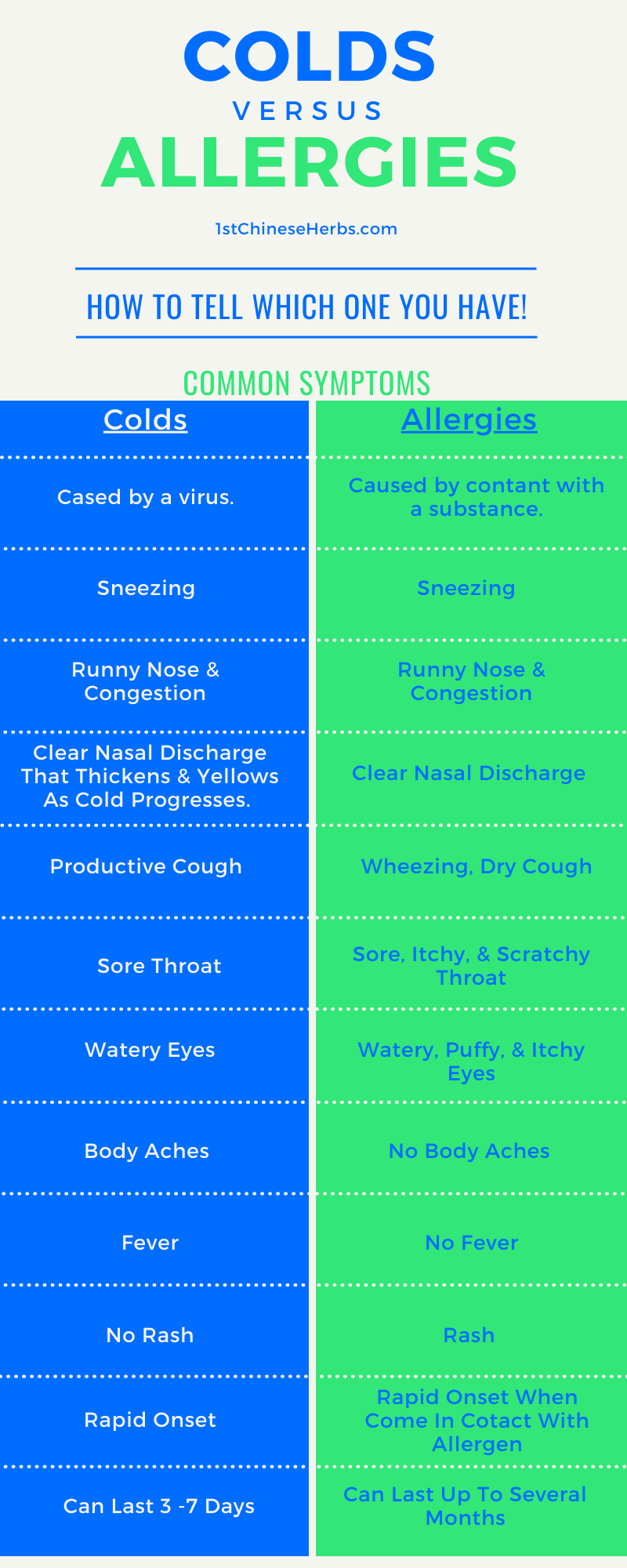Do I Have Allergies Or A Cold?
It can be difficult to tell the difference between a common cold and allergies. Both can make you feel miserable and share many of the same symptoms. But don’t despair, there are some easy ways to tell the difference!
The Cause
Colds: Colds are caused by a contagious virus that attacks the upper respiratory system. The cold virus is typically spread through mucus droplets that are expelled when an infected person coughs or sneezes. You can get a cold any time of year, but they are more common in the fall and winter months.
Allergies: Allergies are caused when a substance (allergic trigger) causes an adverse physical reaction. Allergies can occur all year long, seasonally, or single event, depending on the culprit. Many things can cause an allergic reaction. Common allergens include plants, pollen, mites, mold, fungus, dust, animal dander, and some foods.
Symptoms
Both colds and allergies can have similar symptoms such as a runny nose, nasal congestion, sneezing, coughing, sore throat, and watery eyes. However, if you look closely at your symptoms, you can find differences between allergies and the common cold.
Nasal Mucus: Both allergies and colds can produce runny noses. With colds, the nasal mucus can start clear, but tends to thicken and may become yellowish as the cold progresses. With allergies, the mucus is usually always clear and does not thicken.
Throat: Both colds and allergies can cause a sore throat. Allergies can cause a sore, itchy, and scratchy sensation in the throat.
Cough: Colds generally produce a “wet” cough. When you have a cold, you tend to cough up phlegm or mucus. Allergies produce a “dry” cough and wheezing. You do not produce any phlegm from your throat when you cough with allergies.
Eyes: Colds can produce watery, slightly puffy, and sore eyes. Allergies tend to have a stronger effect on the eyes than colds. They can produce watery, puffy, and itchy eyes.
Body Aches: Body aches and pains that make you want to stay in bed are common with colds. Body aches are not present with allergies.
Fever: An increase in body temperature, fever, is a common symptom of the common cold. Fevers are generally not present with allergies. However, a fever can occur during a severe allergy event.
Rashes: Rashes can be present with allergies, but not usually seen with colds. Allergies can cause skin irritations such as hives or eczema.
Onset
Colds: Usually a rapid onset. Colds generally occur in the fall and winter months.
Allergies: Usually a rapid onset. Allergies can happen any time of the year or when you encounter an allergy trigger. Look for seasonal patterns, contact with pets, or foods that you eat.
Duration
Colds: Colds last a short time. Colds last the duration of the viral infection, generally 3 – 7 days.
Allergies: Allergies can last a long time, depending on the allergic trigger. If your allergy is to a pet, you will see symptom relief when you are no longer around the pet. Seasonal allergies are another story. For instance, if you are allergic to tree pollen, you may experience symptoms for several weeks or months.
Whether you determine you have a cold or allergies if your symptoms worsen or last longer than expected see a doctor. Both allergies and colds can predispose you to more serious infections.

| Teapills For Immune Boosting | Teapills for Allergy Symptoms |
 |
 |
 |
 |
 |
 |
References:
https://www.healthline.com/health/allergies/allergies-or-cold#allergy-treatment
https://www.health.com/condition/allergy/allergies-or-cold
https://www.webmd.com/allergies/sinus-nose-tool/allergies-or-cold

